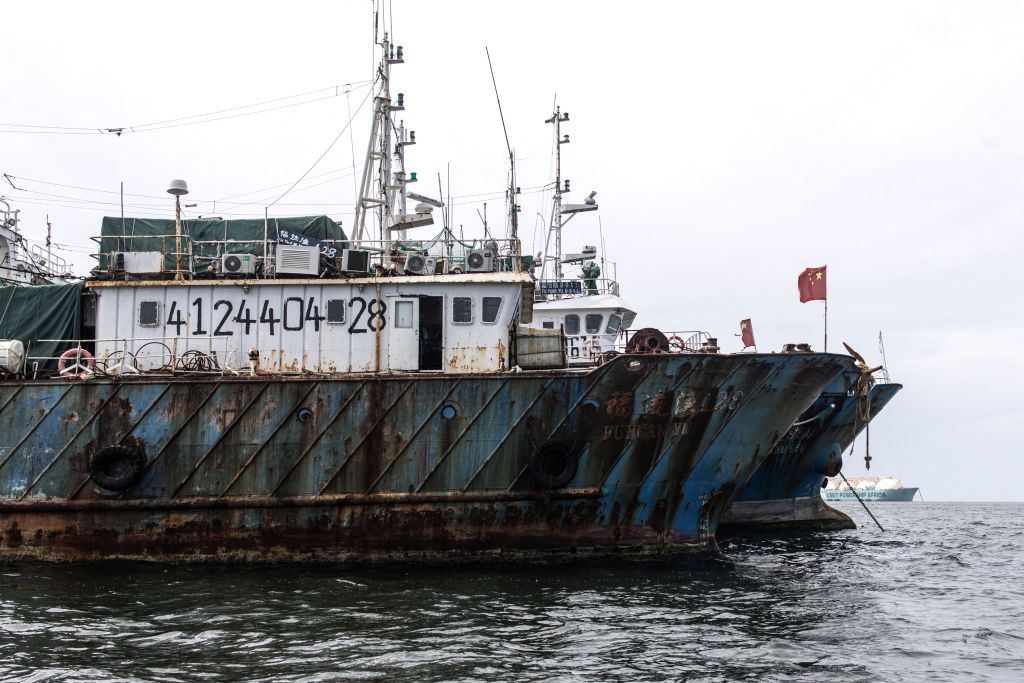Ghana continues to make a stand against illegal, unreported and unregulated fishing, a scourge that costs the country between $14.4 million and $23.7 million annually. Ghana’s Fisheries Commission and Ministry of Fisheries and Aquaculture in April suspended the fishing licenses of four Chinese trawlers for a year over an array of violations.
The vessels Meng Xin10, Florence 2, Long Xiang 607 and Long Xiang 608 are all flagged to Ghana but are beneficially owned by three Chinese companies, Ghana Business News reported. Chinese trawlers are notorious for using this practice, known as “flagging in,” in which they abuse local rules to flag a foreign-owned and -operated fishing vessel into an African registry to fish in local waters. Flagging in is a common sign that vessels engage in illegal, unreported and unregulated (IUU) fishing.
At least 90% of the industrial trawlers operating in Ghana are owned by Chinese corporations, according to the Environmental Justice Foundation.
Officials suspended the four vessels for unauthorized transshipment of fish at sea, a practice known as saiko: dumping unwanted fish; fishing in restricted zones; and harvesting juvenile fish. All of these practices lead to declining fish stocks and destroy ecosystems critical to the survival of marine life. They also drive food insecurity and threaten the livelihoods of more than 2 million people employed by Ghana’s small-scale fisheries.
Saiko has pushed the population of Ghana’s small pelagic species such as sardinella to the brink of collapse. Pelagic fish are easier to catch than are deep-water species.
“Saiko is precipitating the collapse of Ghana’s staple fish stock and with it, poverty and hunger for its people,” Steve Trent, executive director of the foundation, said in a Dialogue Earth report. “Chinese trawlers are making millions of dollars in an illegal trade which makes up over half of the fish caught by industrial boats in Ghana.”
Only artisanal fishers are allowed to catch pelagic fish in Ghana, but large commercial fleets continue to haul them in, robbing local fishing communities of revenue. The average annual income of Ghana’s more than 100,000 artisanal fishermen has dropped by as much as 40% per canoe in the past 15 years or so, according to the foundation.
Industrial vessels also harm fish populations by using illegal nets to catch juvenile fish, fishing with powerful lights at night, and fishing with explosives. “This compounds the plights of artisanal fishers and frustrates efforts aiming to address illegalities in the artisanal sector,” Nana Kweigyah, an artisanal fisherman in Ghana, told Oceana, an international organization dedicated to conservation.
China commands the world’s largest distant-water fishing fleet and is by far the world’s worst illegal fishing offender, according to the IUU Fishing Risk Index. Of the top 10 companies engaged in illegal fishing globally, eight are from China.
Chinese trawlers also notoriously engage in bottom trawling, dragging a huge net along the ocean floor, indiscriminately scooping up all manner of marine life. The practice kills juvenile fish, leading to declining fish stocks, and destroys ecosystems critical to the survival of marine life.
The Meng Xin fleet, owned by the Dalian Mengxin Ocean Fishery Company, is linked to the 2019 disappearance of Ghanaian fisheries observer Emmanuel Essien. He went missing from the Meng Xin 15 trawler after filming the crew illegally discarding fish at sea and filing a report with the country’s Fisheries Commission. Essien has not been found,
Ghanaian fisheries observers interviewed by the BBC years after Essien’s disappearance said workers earned low wages on foreign trawlers and it sometimes took as long as five months to get paid, meaning kickbacks from Chinese and Ghanaian crew managers were necessary to feed their families.
“If you reject the bribe you go home hungry,” an observer told the BBC.
Emelia Arthur, Ghana’s new fisheries and aquaculture development minister, has promised greater transparency in the fisheries sector. In April, Ghana joined Cameroon and South Korea to officially endorse the Global Charter for Fisheries Transparency. The charter aims to ensure that information about vessels and fishing is widely available to promote responsible fisheries management, eliminate illegal practices and protect human rights at sea.
“I stand here fully subscribing to the Global Charter for Fisheries, which for me is in-caught within a framework of accountability,” Arthur said in an Oceana news release. “Not just because it’s important to do, but it’s also because it reflects Ghana’s fisheries laws and objectives and sets a good map for reforms.”

